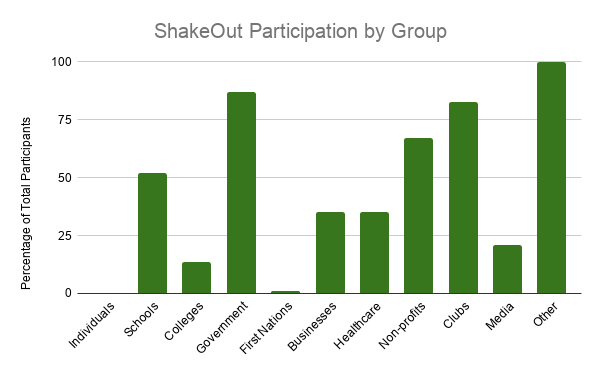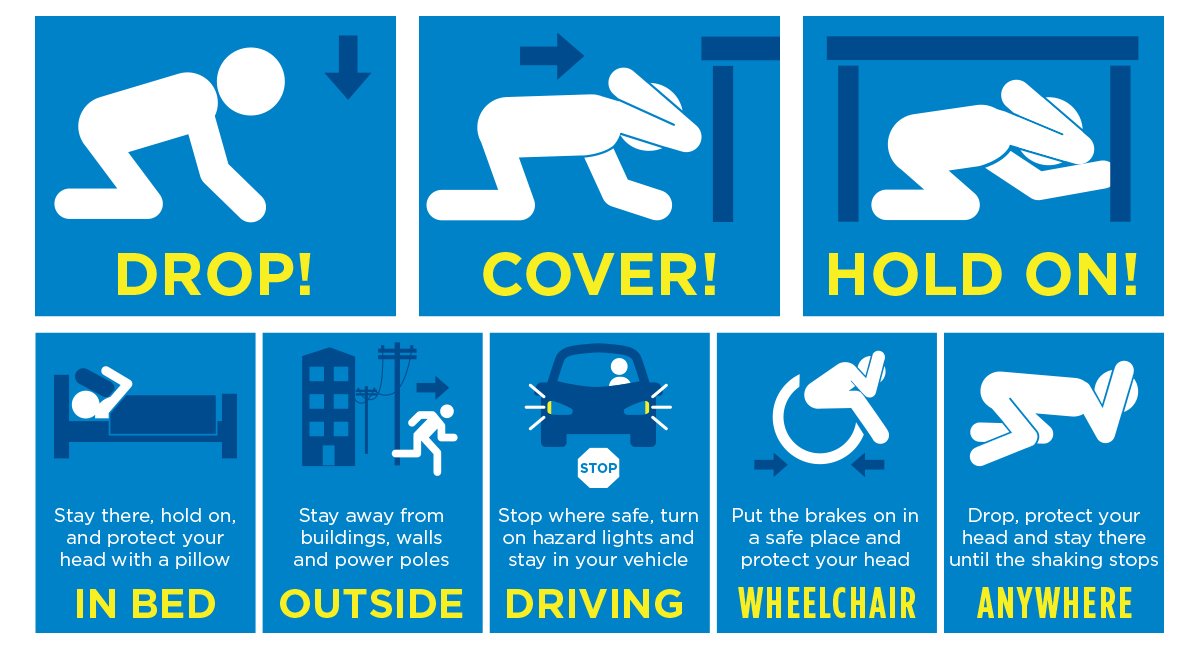Tiegan Hobbs, Ph.D., Postdoctoral Seismic Risk Scientist, Temblor @THobbsGeo
Across the planet, people dropped under their tables at 10:17am on 10/17 to practice what to do in the event of an earthquake. Now: three easy things you can do this weekend to be more prepared for earthquakes.
Citation: Tiegan Hobbs (2019), Over 66 million people participate in international ShakeOut; prompts evaluation of personal preparedness, http://doi.org/10.32858/temblor.052
The Great ShakeOut
Yesterday at 10:17am on October 17th, was the Great Shakeout. It’s a global earthquake drill that’s been going on since 2008, which this year had almost 66 million registered participants. Over 10 million came from California alone!
ShakeOut had almost 66 million registered participants this year, with great turnout from schools and government.
Should I run out of the building?
The point of the event is to practice what to do in an earthquake. It’s a critical exercise, because while the experts tell us to ‘Drop, Cover, and Hold On’, some people mistakenly believe they should seek shelter in a doorway or next to something sturdy (the ‘Triangle of Life’). Even worse, many people still believe they should run out of a building. In reality, the edge of a building is usually the worst place to be due to falling debris. What’s more: in a very large event a person likely wouldn’t be able to stand, let alone escape a building.
Recommended actions for almost any scenario can be found here.
In the event of an earthquake, do not try to move to another location. Seek shelter where you are: Drop, Cover, and Hold on.
Pictures from Twitter show participants hiding out under tables, but there was also a lot of conversation about what happens after the quake. “How will I get home?” and “What about aftershocks?”. The big question today has really been: “Am I ready?”
Our Hurricane Maria Team took cover at 10:17am on 10/17!!! #ShakeOut pic.twitter.com/ICc4TZw5bl
— Judith MitraniReiser (@DoctoraDisaster) October 17, 2019
So what options do the 50,000 daily riders of Metrolink have? @JacobMargolis reminds us most live w/in walking distance of home. It’d take me 9 hrs to get home but if that’s all I had w/ rails & streets damaged, that’s what I’d do. At least until I could get a ride. #ShakeOut pic.twitter.com/iA6otfTO8k
— Brian Olson (@mrbrianolson) October 17, 2019
Three easy things you can do to be more prepared
It’s easy to feel overwhelmed by the documentation about how to prepare. Much of it can be time-intensive or expensive. Here’s three simple things you can do this weekend to feel better equipped to handle disaster. And only one of them costs money.
(1) Have a meetup and contact plan
It’s safe to assume that there won’t be reliable cell service immediately after a large earthquake. You might also be without power to charge your phone. Additionally, driving may be difficult and transit could be severely disrupted. Where will you go and how will you get in touch with your loved ones? Have a plan for a safe meetup place. Be sure to have the phone number of a person out of the affected area, so that if you find a way to make a brief phone call you will be able to tell them you’re alright. Make sure your entire family has their information as well, in case you’re separated. Sometimes it’s easier to call outside of the disaster zone than within it.
(2) Assemble food, water, and medicine in a backpack
Immediately after an earthquake you may need to vacate your house quickly. Keep 72 hours worth of food, water, and emergency supplies in a backpack near the door. It doesn’t have to be a fancy kit. Just a few litres of water per person, high calorie food like granola bars, a basic first aid kit, any prescriptions you require, toilet paper, a flashlight, and your contact plan. Extra supplies like a hand-crank radio, shelter, candles, warm clothes, maps, and firestarters are all nice to have as well, if you’ve got the means. A basic kit for 2 people costs about $25 to assemble, but you probably already have some of the items on hand.
(3) Survey your house for hazardous furniture and utilities
Though it’s not always mentioned, fires are a common occurrence after an earthquake. Gas lines can be compromised, resulting in leaks. Avoid this by immediately shutting off the gas line into your house after a major earthquake. We know this, but most of us don’t know where that valve is. This weekend, take a walk around your house. Ask your landlord. Snoop around near your gas meter. While you’re at it, assess your space for top-heavy furniture or items that are likely to cause injury if they fall. Your greatest danger is from falling and flying objects. Some furniture companies provide free straps to secure items to the wall, or they can be ordered online.
While earthquakes are inevitable, disasters aren’t. Take some time today to prepare yourself, and send this info along to loved ones.
- Dual disaster planning, communication and reason for hope: a discussion with professor Sam Montano - April 14, 2020
- Significant Idaho earthquake unlikely to cause unrest in Yellowstone - March 31, 2020
- Earthquake strikes Utah amid COVID-19 pandemic - March 18, 2020


